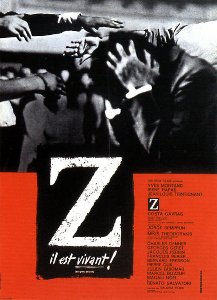
Z
Much like The Manchurian Candidate, Z is a political conspiracy thriller that was both controversial from the time it was released and largely unavailable for a long time, resulting in its legend growing over time. Unlike The Manchurian Candidate, though, which is allegedly pure fiction, Z, while ostensibly a work of fiction, is generally believed to be a pretty accurate account of real events. Though there are no flags in the film, no names of nations, and even military insignia are relatively generic, it’s generally believed to be a thinly veiled expose of political repression in Greece in 1960s.
The plot deals with the assassination of a respected doctor and anti-war activist and the subsequent events both amongst the population and within the government. The film is unrelenting in its scathing indictment of the-powers-that-be. Even though it’s a thriller, its pretty heavy stuff, and it racked up Oscars for Best Editing and Best Foreign Film, and to this day it remains one of the few foreign films to ever be nominated in the Best Film category.
Again, much like The Manchurian Candidate, the legend has outgrown the film (see review of Manchurian Candidate, The). While it’s still a good story, it is definitely dated not in terms of content (history is history after all), but in terms of filmmaking technique. Many action sequences seem pretty lightweight given what has come since. Furthermore, modern audiences – especially monolingual English speakers – are likely to find it drags, and is overly talky, perhaps even preachy. While this might not be a problem for a film like All the President’s Men, or the aforementioned Manchurian Candidate, when faced with big chunks of subtitling, well, you can imagine the drawback.
Still, there is much to commend it. It didn’t win an Academy Award for editing for no reason. The way the film cuts together with the music score in the latter part of the film is something that was almost unprecedented in cinema up to that time.
No comments:
Post a Comment